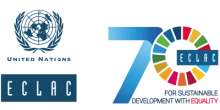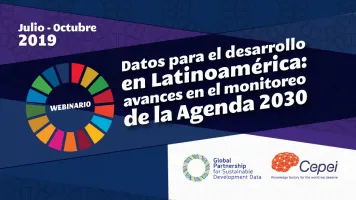The Economic Commission for Latin America and the Caribbean (ECLAC, or CEPAL for its Spanish acronym) is one of the five regional commissions of the United Nations. It was founded with the purpose of contributing to the economic development of Latin America, coordinating actions directed towards this end, and reinforcing economic ties among countries and with other nations of the world. The promotion of the region's social development was later included among its primary objectives.
ECLAC is headquartered in Santiago, Chile. It has two subregional headquarters: one in Mexico City to serve the needs of the Central American subregion and another in Port-of-Spain, Trinidad and Tobago to serve the Caribbean. In addition, ECLAC maintains country offices in Buenos Aires, Brasilia, Montevideo, and Bogotá, as well as a liaison office in Washington, D.C.
Priorities as a partner of the Global Partnership for Sustainable Development Data
Implementation and accountability of Agenda 2030 for Sustainable Development will demand a paradigm shift that will require a renovated institutional architecture and innovative collaboration in both developing and developed countries. As a matter of fact it is in the global South where major innovations need to happen and are actually taking place.
A World that Counts was indeed a result of this type of innovative partnerships. It was prepared by the Independent Expert Advisory Group, which I was part of, convened by the Secretary General to help us understand the magnitude and importance of the digital revolution and the emergence of big data as a tool for public policy and not only for private objectives. The champion of this panel was Amina Mohamed who understands very well the importance of innovation in terms of technology but more importantly on the processes that will be needed for an effective implementation of the SDGs.
CEPAL is a data-driven institution. Figures talk. Our architecture since our creation integrates the three dimensions of sustainable development. In the beginning, economic and social, and more recently environment, gender, and population have become essential pillars of our agenda.
CEPAL is well known for its in-house macroeconomic and sectoral research and analytical capacities. In its more than 60 years of existence, it has a wide-ranging network of experts and multi-stakeholder from our region.
At present, CEPAL is the secretariat of nine subsidiary inter-governmental bodies that bring together national authorities, key actors of the private sector and other stakeholders. Let me mention three that are closely related to this open government initiative:
- Statistical Conference of the Americas (CEA) which brings the National Statistics Systems and provides a platform for knowledge sharing, disseminating methodologies, and capacity building throughout the region.
- Regional Council of Planning (RCP) which convenes the Ministers of Planning and is promoting the inclusion of SDGs in the national planning processes with a long-term vision and with the participation of Civil Society and private sector organizations.
- Regional Conference on the Information Society in LAC.
Connected with these institutional processes, CEPAL also is actively participating and supporting the Open Government Partnership.
Implementation of 2030 Agenda will need skills and capabilities to generate new knowledge, data and evidence-based ideas, as well policy advocacy in areas such as equality, inclusion, and social justice agendas; financial stability and financing for development. We need to emerge from the trap of natural resources extraction dependency and move towards structural diversification combining the technological revolution as well as the urgent need for more environmentally oriented patterns of consumption and production.
The paradigm shift will require renewed multi-stakeholder social and political compacts to move from the culture of privilege to a culture of equality.
Data, new metrics, indicators, and multi-dimensional methodologies will be key in these new social pacts. Strengthening data ecosystems will be essential to move away from business as usual.
Our generation is already part of the technological revolution. Now we need the political will to make all this available to all. This is why access to information, is an essential part of democracy and the future governance.
Information that can be obtained in real time through big data revolution, indicators that need to be historically analyzed through the national statistical systems and geographical methodologies to understand much better the territory and the local agendas.
New institutional frameworks will require better regional coordination, based on existing initiatives already underway inside and outside the UN System.
The UN needs to understand and adopt big data, to take advantage of the digital revolution as a tool to collaborate better. We can also use initiatives, such as the Global Partnership for Sustainable Development Data to support regional and subregional initiatives such as CELAC who are committed to this transformative 2030 Agenda.




